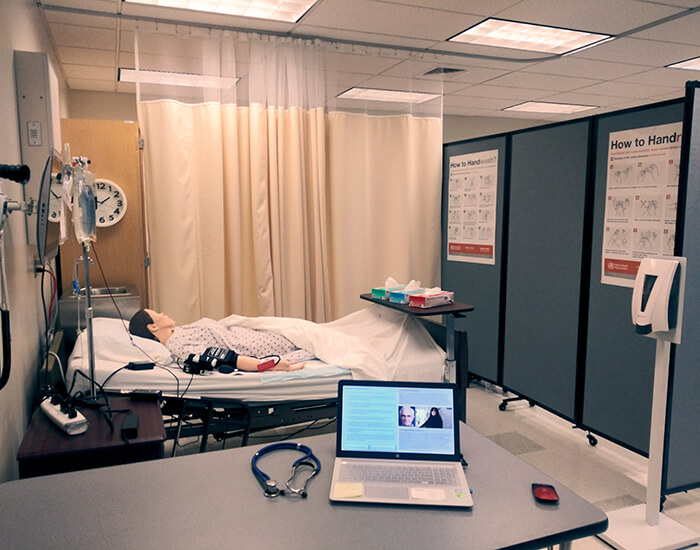About 80,000 critically ill patients die in hospitals each year due to the unwashed or improperly washed hands of healthcare practitioners. Effectively teaching proper hand hygiene was the focus of Keck Graduate Institute (KGI) Instructional Designer Kevin Glover's article, "Learner-centric Design of a Hand Hygiene Serious Simulation Game for Grade 12 Emerging Health Professional Students." The article was published online on January 22, 2021 and is scheduled to be published in a special print edition of TechTrends in May.
"My research interests were focused on process-oriented health professional tasks like improving the insertion of peripheral IV catheters, improving nursing efficiency related to smart infusion pump and electronic health record integration, and reducing infiltration and extravasation via the use of near-infrared vein visualization technology before computed tomography scans," Glover said.
When he decided to pursue his PhD, Glover shifted his research from healthcare professionals in hospitals to secondary education Emerging Health Professionals (EHP) enrolled in Career and Technical Education (CTE) programs.
"Females in secondary education health science programs represent an ideal study population with which to explore new educational approaches to instill optimal hand hygiene knowledge, skills, attitudes, and behaviors at the outset of their careers," Glover said. “There are approximately 390,000 predominantly female secondary education students enrolled in CTE health sciences programs nationally. Long-term, an effective hand hygiene educational approach with this population of students could result in reduced patient morbidity and mortality due to healthcare-associated infections as these young women embark upon their careers.”
The development and testing of innovative educational models such as serious simulation games have been suggested for greater internalization of hand hygiene best practices behaviors, but 50 percent of EHP CTE female students do not play, or rarely play, games of any kind.
Thus far, the goal of Glover's research has been to better understand the value, achievement, and cost motivation of these students related to their choices to actively engage in academics, athletics, extracurricular, volunteer, and leisure activities like reading, watching movies, or playing games. In this publication, Glover describes the development of a serious simulation game designed to motivate non-game-oriented 12th grade CTE EHP students to persistently practice (play) situationally appropriate hand hygiene behaviors to a mastery level.
Glover has been working with these students for three years, and this is the fourth publication related to his dissertation research. Students' composition in the EHP program is diverse, consisting of aspiring surgeons, biomedical engineers, nurses, physician assistants, and public health lawyers.
"These are pretty committed, AP-oriented young ladies," Glover said. "They are extremely competitive but also highly empathetic."
The Hand Hygiene Serious Simulation Game is designed to immerse these students in a competitive situation associated with patient care to satisfy their need for competence, autonomy, and social connectedness. In the game, participants compete against a super-bad bacteria that could potentially harm their virtual patient if they don’t perform handwashing correctly.
"The CTE EHP program teaches these students how to wash their hands and don and doff their gloves, but they practice these tasks in isolation," Glover said.
"Participating in the Hand Hygiene Serious Simulation Game will be their first opportunity to combine and apply all the infection control skills they have learned while providing clinical care to virtual patients."
For a specific task such as checking for vital signs, students will need to make decisions such as using gloves, washing their hands with soap and water, or using an alcohol-based hand rub. Performing the task correctly affects whether or not they advance to the next level.
The first CDC guidelines recommending health professional handwashing in hospitals was published in 1986. Even though hand hygiene has been taught for decades to pre-professional healthcare students via traditional education methods, clinically appropriate, procedurally correct hand hygiene is performed less than 50 percent of the time by healthcare professionals.
The goal of Glover’s Hand Hygiene Serious Simulation Game is to immerse emerging health professional students in a realistic clinical practice setting within a patient narrative that motivates them to overcome demanding clinical challenges. It is hoped that sustained engagement in the game will instill best hand hygiene knowledge, skills, attitudes, and behaviors in health professional students that ultimately transfers to better real-world patient care.
"If the design of the Hand Hygiene Serious Simulation Game proves effective during early efficacy testing, a more scalable version can be developed so it can be more easily distributed to individual health sciences students," said George Bradford, KGI's director of instructional design and development. "Doing this will provide them with a way to practice relevant skills to mastery in a challenging and safe environment at very modest expense. This approach can be adapted to address many other necessary skills in our hospitals and clinics. Kevin’s work is a testimony to how instructional designers can build effective learning solutions where the need is vital."
